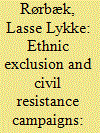| Srl | Item |
| 1 |
ID:
166671


|
|
|
|
|
| Summary/Abstract |
Previous research has argued that political inequality between ethnic groups increases the likelihood of both nonviolent and violent protest. In this study, I focus on civil resistance campaigns and argue that the probability that these large-scale, organized movements will take violent over nonviolent forms increases with the share of a country’s population that is excluded from political power on the basis of ethnic affiliation. I expect this to be so because ethnically exclusive regimes are more likely to counter political demands with violent repression, which increases the cost and decreases the anticipated success of nonviolent relative to violent resistance. I test this proposition in a global sample of countries for the period 1950–2006 and find, first, that high levels of ethnic exclusion make civil resistance campaigns more likely to occur violently than nonviolently. Next, to assess the mechanism at play, I conduct a mediation analysis and show that almost half of the effect of ethnic exclusion on violent campaign onset is mediated by the latent level of violent repression in a country. This result suggests that political authorities’ repressive strategies are key to explaining why regime opponents do not always opt for nonviolent forms of civil resistance.
|
|
|
|
|
|
|
|
|
|
|
|
|
|
|
|
| 2 |
ID:
173132


|
|
|
|
|
| Summary/Abstract |
In this article, we investigate the relationship between elections and coup attempts. We argue that elections have opposing effects on the risk of coup attempts, depending on the state of the economy in which they are held. Elections occurring in conditions of economic crisis spur anti-government mobilization and high levels of state repression. This increases the subsequent risk of coup attempts. Conversely, elections held during economic expansion induce pro-government mobilization and waning repression, which reduces the subsequent risk of coups. We find strong support for these propositions in a statistical analysis of 130 countries that conducted contested elections in the period 1952 to 2013. The results are robust to an array of model specifications, including when we account for election outcome, postelection economic performance, and the possibility that both elections and economic performance are endogenous to coup attempts.
|
|
|
|
|
|
|
|
|
|
|
|
|
|
|
|